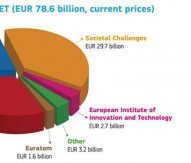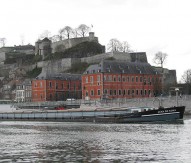
H2020 officially launched in the Czech Republic
The Czech Republic has become the latest EU member state to launch Horizon 2020. The Central European country has so far benefitted €220m of RDI funding from FP7 with its greatest research successes in many of the European Commission’s Key Enabling Technologies, namely ICT, nanotechnology and nanosciences. The Czech Republic has also been highly successful in the areas of transport and health research.
The launch event took place in the capital Prague as part of the ‘H2020 TEERA’ conference, which focused on encouraging the development of consortia to assist applications for funding under Horizon 2020. Addressing attendees, Máire Geoghegan-Quinn, European Commissioner for Research, Innovation and Science, outlined how Horizon 2020 presented a ‘world of opportunities’ to a country with a long industrial history.
“Your strong industrial tradition dates back to the early days of the industrial revolution when Bohemia and Moravia became an economic and industrial powerhouse. Your talent for manufacturing is exemplified in fine crystal and Škoda cars, and of course in quality pilsner beers! This long-standing reputation, together with the quality of your people, has attracted many foreign investors and has put the national innovation system on a good path. Your country is also rich in research opportunities. It has produced some of the best scientists, inventors and innovators, many of whom have made remarkable contributions.”
The Commissioner described the Czechs as having a “thirst for knowledge and innovation” and outlined her optimism for significant and continued participation in the replacement for FP7.
Wider participation
Geoghegan-Quinn has been working closely with Johannes Hahn, European Commissioner for Regional Policy, in order to encourage countries and regions to become more greatly involved in Horizon 2020. The new Structural and Investment Funds have been closely developed with Horizon 2020 in order to encourage scientific excellence.
“Under the new cohesion policy, each member state and region should develop smart specialisation strategies that build on their respective strengths. It means that they will be betting on their most likely winners. In fact, such a strategy will be a precondition to research and innovation funding from the European Structural and Investment Funds.
“Excellent scientists need excellent facilities. Upgrading research infrastructure and equipment will come within the scope of EU Cohesion Policy. This means everything from laboratories and equipment to supercomputers and high speed data networks. The EU-funded ELI facility on the outskirts of Prague and the Central European Institute of Technology (CEITEC) in Brno are perfect examples. Horizon 2020 will also introduce a dedicated set of measures to spread excellence and complement the Structural and Investment Funds.”
The Commissioner said she hoped Horizon 2020 will help bridge Europe’s innovation divide, particularly between Eastern and Western Europe.
“Most research and innovation indicators, whether it is the Innovation Scoreboard, Government expenditure on Research (GERD) or, for instance, participation in the ERC, clearly show that some countries, mainly in Central, Eastern and Southern Europe are not yet fully exploiting their research and innovation potential. By its very definition, not every university or research institute can be the very best in its field. Excellence cannot be everywhere, but I firmly believe that excellence can spring up anywhere. The new twinning and teaming actions as well as the ERA chairs will strengthen the scientific excellence and innovation capacities of emerging institutions.”
Czech’s Horizon
Geoghegan-Quinn continued by describing how Horizon 2020 would be an excellent opportunity for the Czech Republic, particularly considering the country’s emerging science base.
“Your manufacturing skills, linked to your proximity to other leading manufacturing centres and the quality of your people, has attracted many foreign investors and has put the national innovation system on a good path.
“Second, Horizon 2020 promotes innovation and the Czech Republic needs more innovation. Your country is classified as a moderate innovator on the Innovation Scoreboard index. It is also a medium to low performer in the European innovation output indicator, ranking 16th out of the EU28. I want you to improve on this, and Horizon 2020 is there to help.
“Third, Horizon 2020 will help you address the urgent need to increase co-operation between research, innovation and industry, a problem shared by some other member states, and allow Czech innovation to really take-off, as it clearly has the potential to do.
“SMEs, in particular knowledge-based SMEs that are active in innovative sectors, need to rely on strong and willing partners in the academic world. Almost everywhere in Europe, this is a prerequisite to the development of innovation activities by domestic firms.
“Fourth, Horizon 2020 will fund research and innovation in areas where you have competitive advantages. These include smart specialisation, tackling societal challenges, SME participation, synergies between research, innovation and industry, and a stronger focus on impact and results.”
R&D investment
Geoghegan-Quinn continued by calling for greater reforms in the provision and distribution of RDI funding, both at national and supranational level. She also announced the need for changes in the European industries to encourage the creation of jobs and economic growth, key goals of the European Research Area and Innovation Union
“We need to reform national systems because it is here that the vast bulk of research and innovation money is still invested. This money needs to be spent as efficiently as possible, getting the best possible results for the money. It is no use pouring research money into defunct systems.
“Reform is not easy … I encourage you to take an honest look at your national research and innovation system to identify any room for improvement. I know how difficult it is to simplify and become more efficient, but I am convinced that it is worth the effort. We owe it to our researchers and entrepreneurs to make their jobs as easy as possible.
The Commissioner completed her address with a resounding message on Horizon 2020.
“In the long run, creating an efficient, outward looking and dynamic research and innovation system will ensure that your economy has a solid, long-lasting foundation. We want this for every country in Europe, and Horizon 2020 can provide the spark.”




